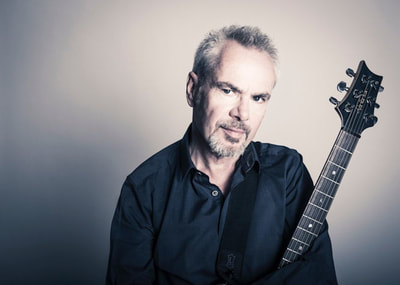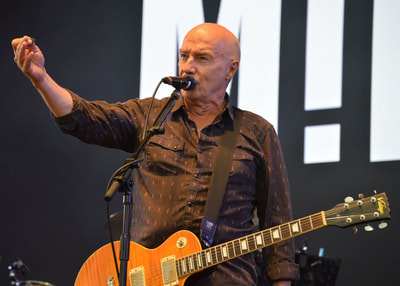|
As the man whose "job was the music" as part of iconic eighties three-piece Thompson Twins, Tom Bailey achieved phenomenal success in the first part of his career. With hits like 'You Take Me Up', 'Doctor! Doctor!, and of course 'Hold Me Now', he's back celebrating a career that he had left behind for almost three decades. "You look back and think, what we were doing thirty years ago becomes the sensible thing, not a stupid thing, because a lot of perspective had been created by that time", he says as we sit down at Rewind South Festival. Chatting what bought him back to his past, and how they missed out on Band Aid, we caught up with Tom Bailey. Science fiction; Eamon O'Neill.
Hi Tom, how does it feel to be back at Rewind Festival?
It’s fantastic, yeah. I mean, it’s another hot day. We’ve been very lucky because when you do a long run of festivals in the U.K. the chances are something’s going to go wrong, weather-wise, but we’ve been lucky! We’ve had great times, yeah. The last time you played Rewind, you presented a very visual show, with the band all dressed in white. It’s become a habit, actually! One of the reasons is, especially when you’re playing in the afternoon sun, there’s no effective lighting. It means people at the back can still see you, and see what you’re at when you’re wearing white. It’s just a simple fact of life. I once went to see a concert featuring Michael Jackson and Marilyn Manson; one was dressed in white, and one was dressed in black, and guess which one I could see?! I wanted to talk about your recent solo album ‘Science Fiction’, which was genuinely one of my favourite releases of 2018; what kind of sound were you going for with that one? I wanted to carry on with a kind of contemporised version of synth pop from the ‘80s, but not rigidly nostalgic in that sense because we’re using different machines and we’re different people now. But, song-wise, it was kind of the umbrella concept for the album. As soon as I had that idea; science fiction being a strange way of examining the present and its problems, then a lot of the songs relate to that, but then it’s curiously also about, I guess, a relationship where you can’t get someone’s attention because they’re obsessed with – in this case – reading science fiction. And that often goes on; that’s what happens in life, so it was an easy song to write in the end. It's so cleanly produced; how did you record it? It’s all done on Logic on a laptop, and once more, a lot of that was written on the backs of busses and in hotel rooms. If I had a day off on tour, I’d just record, and then maybe clean it up later. But that’s the big change for me in terms recording habit, is the technology means you carry your studio wherever you go, and that’s a fabulous thing. So there’s no need to demo stuff, and record it properly later. Yeah, but there are other problems. Because of the ease of the technology, you can record a song ten times and then not know which one to go with. The indecision kicks in and the self-doubt. But generally speaking, I think everyone finds their own balance in those matters. Do you think that means you’ll be more likely to produce pop music more regularly, once again? Well, I’ve no idea. I mean, I kind of did that, in a way, for fun, to see what would happen. You see, since the good old bad old days of the Thompson Twins, the world has changed and the industry has changed. We don’t go on tour to promote records, it’s the other way around; we make the odd record to promote out touring. So, I don’t really fell the need to put out a record unless I’m going on some big world tour. So, I’m always writing, in fact I was writing this morning before I came here. Lots of stuff is waiting in the wings but, the point at which I take it to completion is anyone’s guess. Going back you your early career, and what was it like for you when Thompson Twins achieved that huge success and broke America?
People keep telling me this, and I’m beginning to think that maybe I didn’t appreciate it at the time, how big it was, in a way! And of course that’s understandable because you know, you just get caught up in the whirlwind of a thing like that, and it doesn’t necessarily change how you feel about yourself or what you’re doing; you just carry on doing it at a slightly busier level. But looking back, yeah, it was an amazing thing. I mean, ‘Live Aid’, that was one of the peaks of that era, in a kind of beautiful and powerful era of pop music. It was a real thrill, and a real privilege to do that. What an honour that must have been to share that stage. And here’s where I get serious, right; back in the day there was still a sense that rock and roll and pop music was this kind of illegitimate cousin; it had an ambition and a responsibility to criticise the world and propose a better way of doing things. You know, there was an ambition, there was like an activism at the heart of it, and call me old fashioned, but I still kind of believe in that, whereas I see what has happened is it’s turned into a way of becoming famous and making money, and nothing else, really. So I still think that the memory of something like Live Aid and all those concerts back then, and all those bands, and all those songs, it’s worth evoking them in the best possible sense of nostalgia because it reminds us that we can do something and make the world a better place. Thompson Twins, as you say played at Live Aid, but you weren’t on the Band Aid single; was there a reason for that? I think it was a missed phone call. It’s one of those crazy things where we were doing a show in Europe somewhere and the managers came with us, and back in those days there weren’t mobile phones, so if you weren’t in your office you didn’t get the call. Bob Geldof insists that he was calling our office all the time and we never replied, so yeah, we messed up! Looking back to those days, have you any desire to put the three of you back together as Thompson Twins? Well, the other two have always been reluctant. They just didn’t want to do it, and in a sense, it got to a point where I felt held back by that, so I just did it on my own. And also, to be honest, I did it before they joined the band and I did it after they left, so the continuity is there. And also, within the successful three-piece Thompson Twins we had a very clear division of labour, and my job was the music; writing the music and making sure it was performed properly. So, that’s all I do, really, whereas they had other interests and they drifted off into other things. Your job was the music, so what were the others’ jobs? Alannah [Currie] of course wrote lyrics, and also she was very much consumed with the visual aspect of the band and how to get on the front page. She was a good disrupter of the status quo, so it’s really important to have someone like that in the band. Was she responsible for your ponytail?! Erm, not directly, but yeah, she would have things to say about the way we looked collectively, and themes and those kind of things. And Joe [Leeway] came from a theatre background, so he was interested in getting the live show sorted out, and as I say, my job was the music. So we didn’t really stray into each others’ area of responsibility, and it’s an interesting thing because when you’ve got three people, you can’t have a split decision; it always goes one way or the other, or you’re in total agreement. So we never wasted time not being sure, we just kind of got on with things, directed by each other. The band’s final album was released in 1991; did you see the musical tide turning and decide it was the right time to bow out?
I think we wanted to change just like everyone else. We’d got a little bit tired of repeating ourselves, and you look for creative challenges; it doesn’t come if you repeat yourself. I think it takes a long time, and I did take almost a thirty year break from pop music, and at which point you go, “oh”, actually, to look back and think what we were doing thirty years ago becomes the sensible thing, not a stupid thing, because a lot of perspective had been created by that time. So, you know, everyone in the arts does that, you know, a retrospective view of what you did. So it’s much easier now, in way, for me to do the big hits than it was in the ‘90s. The songs have become cool again! Well, that’s not for me to say, but certainly I enjoy it, and there’s obviously an emotional connection still somehow embodied in that work, so I always say – and my band are brilliant musicians – but it’s not actually worth it to me just to go there and play it properly; we have to find that emotional connection, which has nothing to do with being a musician at all; it’s a human being thing. A song like ‘Hold Me Now’ just endures though. Yeah, it’s a popular tune, that’s for sure! But, it came easily, you know, it’s a four-chord trick, and I think the truth of it is, it’s about a real event, so, I mean I’ve told this story before, but; we had an argument, we made up, and we wrote that song. So, in the atmosphere of falling back in love, you write a song like that. Do you still have your memorabilia, clothes and record awards from those days? I’ve recently thrown a lot away, in fact. Some I kept, and some has been distributed, but I’m moving out of London, and my apartment there was just full of so much stuff that I had to be brutal. If I’d have taken things piece by piece and tried to get them in the right order, it would have taken ten years, so a lot of that stuff has gone. And in a way, you know, I feel kind of lighter for it because possessions end up possessing you if you’re not careful. Like this interview? Like us on Facebook and follow us on Twitter for regular updates & more of the same. For all things Tom Bailey, visit Tom's official site. |
|
Tom Bailey
"There was a sense that rock and roll and pop music was this kind of illegitimate cousin".
© 2016 - 2024 eonmusic.co.ukContact: [email protected]
|




